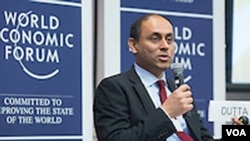NEW YORK —
Cornell University and the World Economic Forum have released their 13th Global Information Technology Report 2014. It ranks 148 of the world’s nations according to how effectively they use information and communication technology to increase their global economic competitiveness.
For several years, Western nations have dominated the top spots in the report’s “Networked Readiness Index.” It compares nations according to their degree of Internet connectivity, the ease of access by businesses, governments and individuals, and other factors. Finland, Singapore, Sweden, the Netherlands and Norway occupied the first five spots, while Switzerland, the United States, Hong Kong, Britain and South Korea were next.
Researchers also discovered that the gap between emerging and developed economies has widened, not narrowed, over the past year, even though access to technology like mobile phones and personal computers has vastly increased in the developing world over the same period.
“It’s not just the question of whether you have a mobile phone,” said Cornell University’s Soumitra Dutta, who co-founded the report, and co-edited this year’s edition. "But does the environment in the country, does the educational system in the country, does the political and business environment in the country support the use of technology to create new economic value?"
Some countries maintained their position or moved up slightly in their relative ranking; but that simply isn’t good enough in today’s world of information technology, according to Jeff Campbell of Cisco, a multinational corporation specializing in computer networking.
“Everybody is improving their infrastructure," he said. "Everybody is improving their business utilization and their government utilization of technology, and the countries that aren’t running fast aren’t going to keep up with everybody else. It’s very real because this is about competitiveness for the future, not only in the IT industry, but also in everything."
Campbell pointed to the growing so-called “Internet of Things,” in which computers connect and direct tools in physical, non-cyber domains, such as farming, "where you can uses sensors in agriculture that will be in the fields that will tell you how much moisture there is in the soil, how much nitrogen, whether you need to re-fertilize, whether you need to water.” Campbell added that, in a world with less water, using the water resources and agriculture more efficiently will provide higher yields and lower costs and be better for the environment.
“That takes technology. Places that adopt, that are going to be more efficient and more effective, it’s going to improve their economy and change that world,” he said.
Campbell said this applies to the factory as well as the farm. “If you can use data and sensors about where your inventory is, where your orders are coming from in order to automatically ensure you have the right supplies to manufacture in the right ways, you’re going to be more efficient and you’re going to win in the marketplace globally.”
The report also found disparities within regions and even within nations. This also was true within large economies like the U.S., where the economic disparity between people working in high-tech businesses and those in traditional jobs has generally widened.
For several years, Western nations have dominated the top spots in the report’s “Networked Readiness Index.” It compares nations according to their degree of Internet connectivity, the ease of access by businesses, governments and individuals, and other factors. Finland, Singapore, Sweden, the Netherlands and Norway occupied the first five spots, while Switzerland, the United States, Hong Kong, Britain and South Korea were next.
Researchers also discovered that the gap between emerging and developed economies has widened, not narrowed, over the past year, even though access to technology like mobile phones and personal computers has vastly increased in the developing world over the same period.
“It’s not just the question of whether you have a mobile phone,” said Cornell University’s Soumitra Dutta, who co-founded the report, and co-edited this year’s edition. "But does the environment in the country, does the educational system in the country, does the political and business environment in the country support the use of technology to create new economic value?"
Some countries maintained their position or moved up slightly in their relative ranking; but that simply isn’t good enough in today’s world of information technology, according to Jeff Campbell of Cisco, a multinational corporation specializing in computer networking.
“Everybody is improving their infrastructure," he said. "Everybody is improving their business utilization and their government utilization of technology, and the countries that aren’t running fast aren’t going to keep up with everybody else. It’s very real because this is about competitiveness for the future, not only in the IT industry, but also in everything."
Campbell pointed to the growing so-called “Internet of Things,” in which computers connect and direct tools in physical, non-cyber domains, such as farming, "where you can uses sensors in agriculture that will be in the fields that will tell you how much moisture there is in the soil, how much nitrogen, whether you need to re-fertilize, whether you need to water.” Campbell added that, in a world with less water, using the water resources and agriculture more efficiently will provide higher yields and lower costs and be better for the environment.
“That takes technology. Places that adopt, that are going to be more efficient and more effective, it’s going to improve their economy and change that world,” he said.
Campbell said this applies to the factory as well as the farm. “If you can use data and sensors about where your inventory is, where your orders are coming from in order to automatically ensure you have the right supplies to manufacture in the right ways, you’re going to be more efficient and you’re going to win in the marketplace globally.”
The report also found disparities within regions and even within nations. This also was true within large economies like the U.S., where the economic disparity between people working in high-tech businesses and those in traditional jobs has generally widened.




